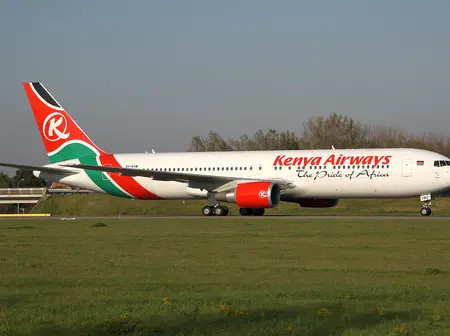Kenya Airways has been handed a significant reprieve. Draft regulations published by Treasury Cabinet Secretary John Mbadi in September 2025 effectively shield the airline’s global software and avionics suppliers from the new Significant Economic Presence (SEP) tax. Without this carve-out, KQ risked seeing its already fragile balance sheet saddled with billions in additional costs.
The rule is precise in its wording: digital service providers are exempt if they supply an airline where the Kenyan government owns at least 45 percent of the shares. With the State’s stake in Kenya Airways sitting at 48.9 percent, the flag carrier clears that threshold comfortably.
The move offers immediate financial relief. But it also raises wider questions about the fairness of carving out exemptions for state-backed companies, while global digital platforms serving ordinary Kenyan consumers remain firmly within the SEP tax net.
Airlines don’t just fly planes. They’re deeply dependent on sophisticated digital systems that underpin nearly every part of their operations. From booking engines and loyalty programmes to avionics that guide pilots through landing in stormy weather, the invisible software stack is massive—and expensive.
In 2024, Kenya Airways spent Sh8.77 billion on its central reservation and loyalty platforms, and another Sh21.97 billion on aircraft landing, handling, and navigation systems. That’s over Sh30 billion tied directly to digital services, much of it flowing to foreign suppliers such as Amadeus, Collins Aerospace, Honeywell, Thales, and Safran Electronics & Defense.
If SEP taxes had been applied, these suppliers would almost certainly have passed on the costs. For an airline that has wrestled with debt restructuring, delayed government bailouts, and volatile fuel prices, the exemption is more than a technical tax tweak. It’s a lifeline to its cost base.
The SEP tax was designed to address a familiar frustration for governments: multinational tech giants generating billions in revenue within their borders without establishing a taxable physical presence. Amazon, Microsoft, Netflix, Meta, and Alibaba are all in the crosshairs in Kenya, facing a 3 percent levy on turnover from digital services.
This replaced the earlier 1.5 percent Digital Service Tax, which critics argued was too low and easy to sidestep. The SEP framework, by contrast, assumes a 30 percent profit margin and applies corporate tax to that notional figure, effectively creating a turnover-based charge.
Carving out exemptions for Kenya Airways therefore sends a clear message: not all digital revenue streams are equal in the eyes of the Treasury. Consumer-facing services like streaming remain taxed, while strategic state-linked sectors such as aviation get special dispensation.
Aviation insiders say this exemption didn’t happen by accident. “Airlines consume a staggering range of digital services—from weather information to maintenance monitoring—and the bills add up quickly,” says tax expert Michael Mburugu of PKF. The implication is clear: KQ and its suppliers lobbied hard, warning that without relief the carrier’s digital dependency would become financially untenable.
It’s a familiar pattern in Kenyan policymaking. When sectors deemed strategic—aviation, energy, banking—face external costs, Treasury often finds ways to buffer them. Yet this raises the uncomfortable question: should the national airline be shielded at the expense of leaving consumers and smaller firms to carry the digital tax burden?
Beyond software, Kenya Airways remains tethered to foreign expertise for maintenance and compliance. Engine overhauls, avionics upgrades, and specialised training still require flying in experts from Europe or North America. The Finance Act 2025 quietly added another exemption here, waiving withholding tax on payments to non-resident providers when the skills are unavailable locally.
This double relief—on digital services and on technical maintenance—underscores how globalised aviation remains. Despite calls to build local capacity, the reality is that highly specialised services can’t be replicated overnight. For KQ, exemptions are not just about avoiding taxes; they’re about staying in the game.
Kenya’s digital tax experiment has been closely watched across Africa. By exempting its national carrier, the government is effectively acknowledging that blunt instruments like turnover-based levies can cause collateral damage when applied indiscriminately.
But it also complicates the narrative. If exemptions pile up, the SEP tax risks becoming riddled with carve-outs, undermining its credibility. Already, global platforms may seek similar relief by arguing that their services are just as essential to Kenya’s digital economy as avionics are to KQ.
The unanswered question is whether Treasury has a long-term strategy for balancing revenue collection with strategic sector support—or whether these exemptions are piecemeal firefighting moves to protect the airline in the short run.
For now, Kenya Airways has won breathing room. Suppliers like Amadeus and Collins Aerospace can continue providing mission-critical systems without tacking SEP costs onto KQ’s bills. Yet the broader debate about who should pay the digital tax—and who shouldn’t—has only grown more complex.
Kenya’s policy choice highlights a tension many governments face: protecting national champions while ensuring fairness in a digital economy dominated by global giants. For KQ, the exemption buys time. For the Treasury, it opens a new front in the contest over how far exemptions should go.

Leave a Reply